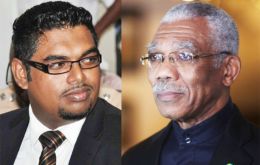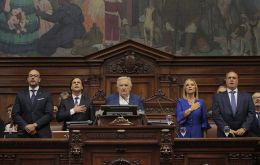MercoPress. South Atlantic News Agency
Stories for March 2nd 2020
-
Monday, March 2nd 2020 - 19:54 UTC
Crucial election in oil rich Guyana; economy forecasted to grow 85% this year, IMF

Guyana goes to the polls this Monday in a pivotal election in one of South America's poorest nations, where a coming oil boom is set to reshape an ethnically-divided political landscape.
-
Monday, March 2nd 2020 - 12:24 UTC
Reedition of Kirchner's aggressive policy towards Falklands announced by Alberto Fernandez

The Kirchnerite government headed by president Alberto Fernandez announced on Sunday, at the opening of the 138th congressional session, the new focus of the Malvinas Islands/Antarctica policy which will emphasize the sovereignty claim over the South Atlantic Islands, particularly the Falklands, and sanction those fishing companies operating in the area.
-
Monday, March 2nd 2020 - 10:06 UTC
Government rotation in democratic Uruguay: business as usual

It was a March sunny Sunday in Montevideo, and for the solid democracy of Uruguay, business as usual. An outgoing center government was replaced by a center-right coalition that emerged victorious from the runoff last November. Despite fifteen years in office, three mandates, Luis Lacalle Pou, 46, is the new president for the next five years and for the first time with a woman vice president, notary Beatriz Argimón.
-
Monday, March 2nd 2020 - 07:58 UTC
New Uruguayan president promises to crack down on crime and promote a true fiscal rule

A center right president took office in Uruguay on Sunday, promising to crack down on crime and tighten government finances after a 15-year string of left-leaning governments. Luis Lacalle Pou, a 46-year-old surfing enthusiast and son of a former president, narrowly won the election in November, 37.000 votes, in his second try for the top office.
-
Monday, March 2nd 2020 - 06:50 UTC
Foreign Office official visits Argentina to address a long agenda including Falklands

Wendy Morton, the foreign office minister of European Neighborhood and the Americas arrives this Monday to Buenos Aires to meet with members of the Kirchner government, who over the weekend announced a new more demanding and aggressive Argentine policy referred to the Falklands and South Atlantic Islands sovereignty claim.
